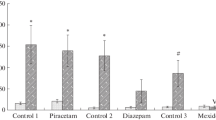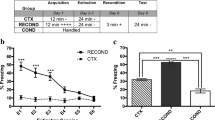Abstract
Drug-dependent learning (lack of transfer between drug states) was demonstrated and disrupted in an escape learning, forced choice T-maze task. A drug-dependent learning (DDL) group was trained to escape foot shock (0.65 mA) while in a drug (chlordiazepoxide hydrochloride) state. These rats subsequently responded randomly on non-shock test trials in the non-drug state, but continued to respond significantly (P<0.02) above random level when in the training drug state. Four transfer groups were also trained in the Drug state, but with a 1 kHz auditory tone simultaneously paired with foot shock. Each Transfer group received a different (0.10, 0.65, 3.5, and 4.5 mA) foot shock intensity during training. The auditory tone continued to be sounded during testing with no foot shock, and percentage correct turns, first-trial correct turns, and latency scores were significantly (P<0.01) different from the DDL group's performance. The results were interpreted as demonstrating that an emotionally-important auditory stimulus could initiate a memory retrieval process that could overcome a physiological state. This memory retrieval process was not modified by wide variations in foot shock intensity.
Similar content being viewed by others
References
Broadhurst, P. L.: Emotionality and the Yerkes-Dodson Law. J. exp. Psychol. 54, 345–352 (1957)
Connelly, J. F., Connelly, J. M., Epps, J. O.: Disruption of dissociated learning in a discrimination paradigm by emotionally-important stimuli Psychopharmacologia (Berl.) 30, 275–282 (1973)
Connelly, J. F., Connelly, J. M., Phifer, R.: Disruption of state-dependent learning (memory retrieval) by emotionally-important stimuli. Psychopharmacologia (Berl.) 41, 139–143 (1975)
Dixon, W. J., Massey, F. J., Jr.: Introduction to statistical analysis. (3rd. ed.). New York: McGraw-Hill 1969
Hill, H. E., Jones, B. E., Bell, E. C.: State dependent control of discrimination by morphine and pentobarbital. Psychopharmacologia (Berl.) 22, 305–313 (1971)
Miller, N. E.: Learnable drives and rewards. In: Handbook of experimental psychology, S. S. Stevens, ed. New York: Wiley 1951
Overton, D. A.: State-dependent or “dissociated” learning produced with pentobarbital. J. comp. physiol. Psychol. 57, 3–12 (1964)
Pavlov, I. P.: [Conditioned reflexes] (G. V. Anrep, trans.). Oxford: Clarendon Press 1927
Sachs, E., Weingarten, M., Klein, N. W., Jr.: Effects of chlordiazepoxide on the acquisition of avoidance learning and its transfer to the normal state and other drug conditions. Psychopharmacologia (Berl.) 9, 17–30 (1966)
Winer, B. J.: Statistical principles in experimental design. New York: McGraw-Hill 1971
Yerkes, R. M., Dodson, J. D.: The relation of strength of stimulus to rapidity of habit-formation. J. comp. Neurol. Psychol. 18, 459–482 (1908)
Author information
Authors and Affiliations
Rights and permissions
About this article
Cite this article
Connelly, J.F., Connelly, J.M. & Nevitt, J.R. Effect of foot-shock intensity on amount of memory retrieval in rats by emotionally important stimuli in a drug-dependent learning escape design. Psychopharmacology 51, 153–157 (1977). https://doi.org/10.1007/BF00431732
Received:
Accepted:
Issue Date:
DOI: https://doi.org/10.1007/BF00431732




